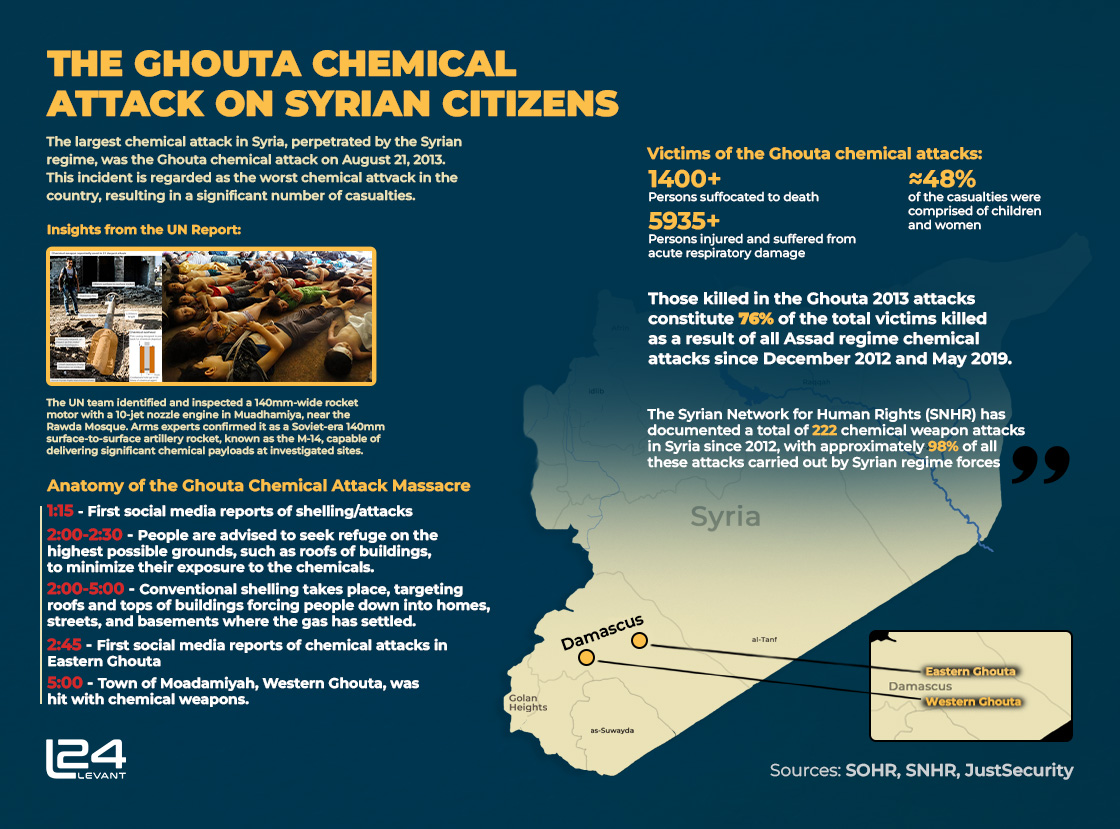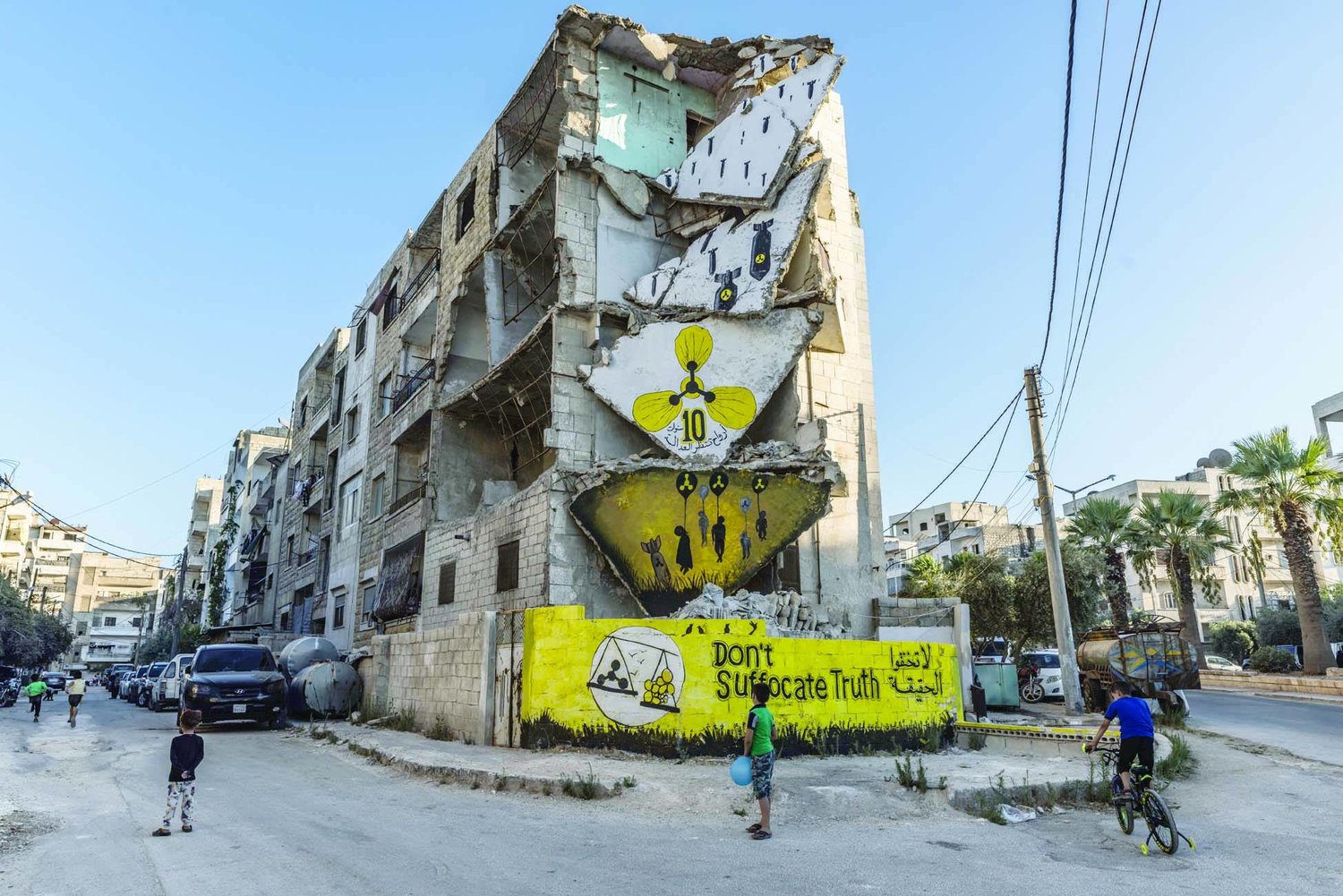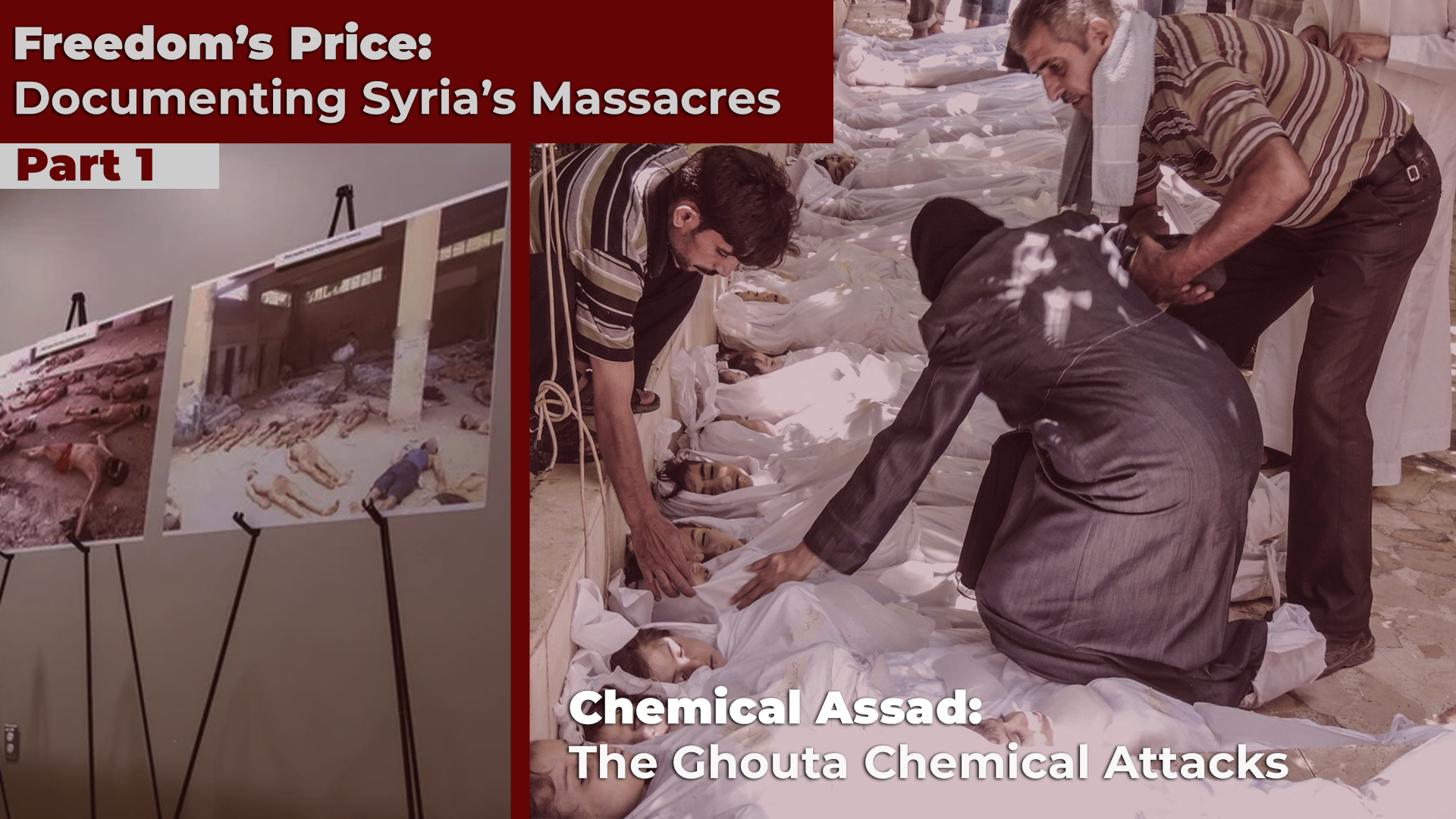Freedom’s Price is a series of articles aiming to shed light on the major massacres that have occurred during the ongoing conflict in Syria over the last 13 years. Each article will highlight crimes the Syrian people have endured in the course of their revolution and the high cost of their struggle for freedom and dignity. The first in the series “Chemical Assad” covers one of the worst chemical attacks in modern history on the heels of the 10th anniversary of the horrific event
It was a sweltering Wednesday night in the Summer of 2013 in Ghouta, a suburb of the capital, just 10 kilometers from the center of Damascus. It had been over a year since the protests demanding justice and freedom had begun and only four months into a siege. Ghouta was surrounded by Assad regime troops and cut off from food and water. The region endured daily bombardment by artillery, planes, and helicopters, yet the free Syrian people remained defiant in their opposition and rejection of Assad and his brutal regime.
In the dead of night, when the air was still and cool, and most were secured in their homes sleeping, none knew what horrors had been planned by the regime. One of the worst chemical weapons attacks in recent history was unleashed upon the people of Ghouta, one that would kill over a thousand in a single night, and injure several thousand. That fateful night was August 21, 2013, and the massacre that occurred would be known as the “Ghouta Chemical Attacks” and earn Assad the gruesome moniker “Chemical Assad” and secure his status as one of the greatest mass murderers of the 21st century.
A Poisonous Plan
In a chilling display of calculated brutality, the regime orchestrated four separate attacks using chemical weapons against densely populated areas. As the clock struck midnight, 10 rockets, each laden with the internationally outlawed Sarin gas, were launched into the peaceful slumber of unsuspecting civilians.

According to a report by the Syrian Network for Human Rights (SNHR), the attacks were premeditated and deliberate acts, designed to inflict maximum harm with ruthless efficiency. “Details of the chemical attack on the two Ghoutas,” says the group, “demonstrate that the Syrian regime had a premeditated and deliberate objective of killing as many residents as possible, including women and children, with the calculated aim of silently, fatally gassing them in their sleep, thereby minimizing any chance of survival”.
The SNHR report points out that local weather forecasts predicted conditions to be relatively cool and calm between 2:00 and 5:00 AM, meaning those responsible knew that the air would be still. The heavy poison gas would naturally drift downwards and settle at ground level rather than blowing away.
Assad’s troops then followed the chemical attacks with conventional weapons meant to trap the people between death by gas or bombings as Ameenah Sawwan wrote for Al Jazeera in 2019, “We had heard that chemical weapons are dense gases so we decided to go upstairs to the ground floor where we thought we would be safer. Then shortly after, a mortar shell landed in our garden, exploding and causing some damage to the house. The regime clearly did not want anyone to survive that day.”

Response of the International Community
International reactions to the attacks were swift and condemning, with the UN launching investigations to uncover the truth behind the use of chemical weapons and publishing several reports on their findings. However, except for work by UN teams, already on the ground at the time, to collect samples and document the aftermath of the attacks little occurred as a result. Even US President Obama’s famous “red line,” which was Assad’s use of chemical weapons against the Syrian people, resulted in little more than calls for the destruction of remaining stocks of chemical weapons and statements from the White House. The result of a Russia-brokered deal was that Assad promised to give up his remaining caches of weapons and close down his weapons program. In exchange, he received guarantees against US military action.
Among those that did take action was the UN’s Organization for the Prohibition of Chemical Weapons
(OPCW) which conducted an extensive on-the-ground investigation and released reports on its findings. The evidence presented in these reports provided “clear and convincing” proof of the use of chemical weapons, shedding light on the harrowing symptoms exhibited by the victims and the profound impact on the affected communities.
Throughout the years following the attacks, the Assad regime and its allies, including Russia, seeking to downplay or deny the regime’s responsibility, have propagated false narratives and misinformation. However, independent investigations, UN reports, and evidence presented by organizations such as Human Rights Watch have consistently debunked this misinformation, providing clear and convincing evidence of the regime’s culpability in the use of chemical weapons during the Ghouta attacks.
In the aftermath of the attacks, the international community, including the US and other nations, emphasized the need to hold the responsible parties accountable. However, the path to justice and accountability has been fraught with challenges. Despite the clear evidence and international condemnation, the Assad regime and its allies have denied involvement and failed to fully declare and verifiably eliminate the chemical weapons program in Syria hindering efforts to bring those responsible to justice.
A Long Road
The pursuit of legal action for the Ghouta chemical attacks has been ongoing, but significant challenges remain. The lack of accountability for the perpetrators of the attacks, as well as the continued use of chemical weapons in the Syrian conflict, has hindered the pursuit of justice for the victims. The survivors of the attacks and various human rights organizations have long been advocating for criminal charges and legal proceedings. Still, the Syrian government’s refusal to grant access to investigators has impeded these endeavors and it has been a long hard road on the path to retribution.

Victims remain hopeful as years of work struggling for the thousands killed by “Chemical Assad” came to fruition in the form of arrest warrants from France for some of those responsible, including Assad himself. This milestone was the culmination of work by a coalition of rights groups including; the Association of Victims of Chemical Weapons (AVCW), Civil Rights Defenders (CRD), Open Society Justice Initiative (OSJI), Syrian Archive, and the Syrian Center for Media and Freedom of Expression (SCM).
Efforts to hold the Assad regime accountable for war crimes and crimes against humanity, particularly regarding the use of chemical weapons, have faced political obstacles at the international level. As a result, independent legal action has been pursued in Germany, France, and Sweden. Attempts to the regime’s answer for their crimes continue, but significant challenges remain. Survivors of the attacks and human rights organizations continue to advocate for justice, despite the obstacles posed by the Syrian government’s refusal to grant access to investigations.
Lasting Scars
These attacks demonstrate the devastating impact of chemical warfare on civilian populations and the horrors that can be carried out in the absence of consequences and both the willingness and capability to hold bad actors to account. The need for international action on behalf of the victims remains paramount, and work to counter misinformation and enforce the rule of law must persist to ensure that such atrocities are not repeated.

As we remember the tragedy of the 2013 Ghouta Chemical attacks, it is crucial to honor the memory of the victims and continue to advocate for justice and accountability. The international community must remain vigilant in countering misinformation and supporting efforts to bring those responsible to account, ensuring that such devastating events are never forgotten and that the victims are not overlooked.
The attacks not only killed thousands of Syrian civilians but left deep psychological and mental scars on those who survived. As one survivor Dr Salim Namour, head of the Association of Victims of Chemical Weapons (AVCW) informed the press that among the worst lasting effects of the chemical attacks were, “the deep psychological trauma, the memories of suffocation and the memories of those we lost and loved.”










